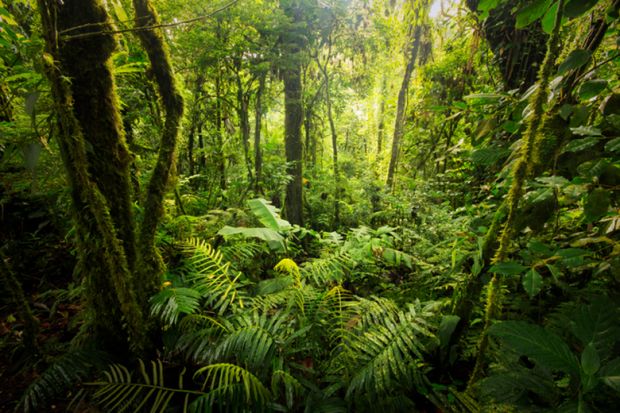The importance of tropical forests is widely acknowledged – even if we are still not good at preventing them being turned into oil-palm plantations. If only forests were protected from human interference, we think, things would surely be better.
Based on decades of botanical fieldwork, Charles M. Peters disagrees. His key claim is expressed in the book’s paradoxical title – “wild” tropical forests are virtually all the result of local people’s management.
This is a short and accessible book – presented in a personal style – but it is also ambitious, featuring 15 case-study chapters spread across Latin America, Africa and Asia, reflecting the diversity of Peters’ experience as a field botanist and resource management expert.
Its aim is to make the case for engaging forest communities in a very fundamental way in tropical forest conservation.
Peters is opposed to the idea that outside experts or state agencies should control management, even though tropical forests are centres for world biodiversity and critical to many aspects of climate and water management. It makes no sense to try to keep forests wild by excluding local people if it is those people’s forest practices that produce the ecologies we value.
Many still need to hear this message, but Peters does not really acknowledge that engaging with local peoples is hardly news for anthropologists and environmentalists. His arguments seem to have won acceptance already.
Still, his love for forest cultures allows him to make some key points in elegant detail. For example, he relates how, in West Kalimantan, he enlisted the help of a local farmer in exploring densely wooded hills.
His guide identified all the principal trees, knew the amount of fruit they bore and the market prices. Then, to Peters’ amazement, he gave him the names of the individuals who had planted each tree. This natural forest was a thoroughly human creation. Peters goes on to highlight how complex a system of tropical forestry many communities manage to maintain – systems much more ambitious than professional foresters would countenance. And this is hardly recent: he offers evidence that it was already true for Mayan foresters.
Inside the book’s central paradox, another lies concealed. The cover blurb highlights Peters’ assertion that “Local people know a lot about managing tropical forests, and they are much better at it than we are”.
These claims are carefully worded since he is very definitely not saying that local people know more about managing tropical forests than science does. He praises their knowledge but also wishes to highlight what he knows even better, whether a method for working out the exact sustainable yield of carving wood or how to take broader ecological linkages into account.
A key story here relates to durian, the famously stinky and delicious fruit. Durian harvests are managed communally, but the trees are pollinated at night by bats. Most of the year, these bats have no durian flowers to visit and live off distant, flowering mangroves. Yet coastal developments are affecting these mangroves, and thus the pollinators, in a way that is just not visible to local people. Peters offers us an uplifting book, but he has not quite nailed the issue of who knows best.
Steven Yearley is professor of the sociology of scientific knowledge and director of the Institute for Advanced Studies in the Humanities at the University of Edinburgh.
Managing the Wild: Stories of People and Plants and Tropical Forests
By Charles M. Peters
Yale University Press 208pp, £25.00
ISBN 9780300229332
Published 10 April 2018
Register to continue
Why register?
- Registration is free and only takes a moment
- Once registered, you can read 3 articles a month
- Sign up for our newsletter
Subscribe
Or subscribe for unlimited access to:
- Unlimited access to news, views, insights & reviews
- Digital editions
- Digital access to THE’s university and college rankings analysis
Already registered or a current subscriber?







